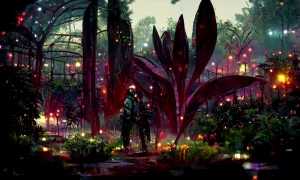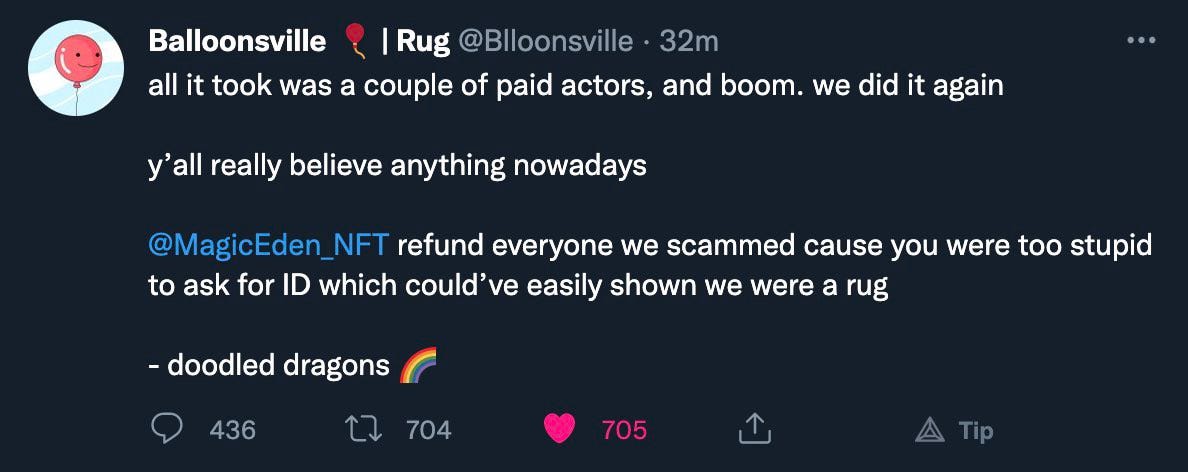Li Jin
The Garden of Magic Eden
How the newest NFT unicorn has mastered scale through transparency, creativity, and community

They then roped in Zhuoxun, another Australian expat friend who had been the second employee at dYdX and was working as a senior PM at Coinbase, and Zhuojie Zhou, who Sidney knew from his engineering days at Uber in San Francisco. The four co-founders—who brought a mix of marketplace, consumer product, engineering, and crypto-native expertise—quickly assembled and began building. At first, they worked under pseudonyms because they still had day jobs. Every minute of their nights and weekends were devoted to Magic Eden: scraping contract addresses, onboarding collections, and hacking together a minimum viable product using an off-the-shelf WordPress theme.
After two weeks of laying the foundations, Magic Eden went live on September 17, 2021, doing $50,000 in volume on its first day. The feedback was instant—and it was overwhelmingly positive. “We knew we had something,” Zhuoxun recalled. “All of us had been at companies where there’d been a lack of product-market fit. We knew instinctively that this was different.”
Magic Eden filled a major gap in the market: in a crowded field of NFT marketplaces, it was focused exclusively on Solana, with an emphasis on user experience and lowering the barriers to entry for NFT creators. By the end of their first month, Magic Eden had 200 collections listed, and the team decided to quit their full-time jobs and go all-in. “We knew we could create a huge generational opportunity for NFTs. Everything felt right,” recalled Jack.
The immediate challenge was building liquidity as quickly as possible—in other words, overcoming the perennial “cold start problem” of jumpstarting a new marketplace. In the fall of 2021, many NFT collections took weeks to reach secondary marketplaces, and in the meantime, users had no way of telling if the listings they came across were reliable or authentic. Magic Eden cut that down significantly: just minutes after a collection’s primary mint, NFTs became available for secondary trading on the platform.
Another key tactic that helped drive growth was migrating liquidity for existing collections. “We found that we couldn’t migrate liquidity for existing collections that were already on other marketplaces,” Zhuoxun said. They also recognized that many top existing collections wanted their own white-labeled marketplace, so they offered to build them for prominent collections like Thugbirdz. These marketplaces shared a backend with Magic Eden and helped siphon liquidity from competitors.
The last unlock was Launchpad, its full-service NFT minting platform. At the time, it was a challenge for creators to launch NFT projects on Solana. They needed to scour the internet for smart contract developers and pay them to build custom minting sites. In December 2021, Magic Eden started to ramp up its Launchpad operations, onboarding creators to launch their collections on Magic Eden and featuring them to its user base. “The learning was that if primary mints happen on the platform, then secondary often stays on the marketplace as well,” Zhuoxun explained. Today, Launchpad is a critical component of Magic Eden’s flywheel, attracting top NFT creators who want exposure to the platform’s broad user base. Over 200 projects have minted through Launchpad, earning over $10 million through their primary mints since inception. “Everyone checks Magic Eden,” said Dallas, the founder of anime-based NFT collection Suteki, explaining his decision to launch through Launchpad in early June. “That’s where everyone goes to look up Solana NFT projects.”
Magic Eden today
Today, Magic Eden attracts over 20 million monthly unique visitors. In addition to the core marketplace and Launchpad, their integrated game discovery platform Eden Games has over 430K monthly active users and 35 games launched so far. The platform retains the vast majority of market share and is typically responsible for over 95% of daily Solana NFT volume. This all despite the fact that Opensea, the market incumbent, launched support for Solana NFTs in April—an event widely predicted to be a “Magic Eden killer.” And there is room yet to keep building: after its most recent Series B fundraise, Magic Eden enters the bear market with a war chest of $130 million and a valuation of $1.6 billion—capital it intends to deploy into growing the team, executing on an ambitious roadmap, and shoring up its defensibility.
Beyond product execution, their growth has also been driven by a community-centric approach, which was referenced by multiple creators and collectors. “They have a reputation for listening to the community,” said Suby, the founder of Okay Bears, a Solana NFT collection that minted through Launchpad in April and quickly topped NFT leaderboards. “They haven’t necessarily done everything right, but they are always adapting and reacting to what the community needs.” The company even has its own term for this building philosophy: “Twitter-Driven Development.”
They say that startups are mirrors of their founders, from the cultural values they codify to the expectations they set through example. From my own conversations and interactions with the Magic Eden team, their culture comes into focus through their actions. In a landscape dotted with scams, Magic Eden is deliberate in putting in place measures to prevent bad actors and manipulation. While other companies often make product changes in a hush-hush manner, afraid to upset their users, Magic Eden makes it a point to explain changes to its community—even when they may be disappointed. And the team is relentless and always on, responding to requests around the clock: one gets the sense that keeping Magic Eden running is like tending to the boilers of a steamship, where constant effort is necessary to keep the business propelling forward.
The Magic Eden team would frame its culture slightly differently. When asked what makes Magic Eden unique from other startups, the team cited a focus on performance (“we play to win”); being authentically web3 over web2 (prioritizing community input over centralized decision-making), and unity and ownership (“your teammate’s problem is your problem”).
To more deeply understand the company’s culture, it’s helpful to start at the beginning, tracing the founders’ stories back to their roots. All four co-founders are immigrants to the US (Jack, Zhuoxun, and Sid are Asian-Australian; Zhuojie lived in China until coming to the US for graduate school). Zhuoxun’s early childhood was spent in Malaysia, until his mother moved the family to Australia when he was five. “She ran an advertising agency for eight years and sold it so that we could have a better education in Australia. She made shit happen. Her sense of hustle and sacrifice is my reference point.” Likewise, Jack says that his drive and ambition echo what he witnessed from his parents, who immigrated to Australia in their 40s despite having successful careers in China. “They didn’t want a life where they could just see the next ten, twenty years play out in front of them,” he said. “That willingness to take a leap of faith and explore the unknown is something I’m really inspired by.”
Each of the founders has their own story of deviating from the path of least resistance to arrive at their current positions. For Zhuojie, that meant diving into a new programming language and learning blockchain development from scratch when he took on the role of Chief Engineer. “I was curious about Rust (the programming language of the Solana blockchain), web3, NFTs, crypto, and running a startup,” says Zhuojie, recalling his reactions after getting the call from Sidney to help start Magic Eden.
Magic Eden views itself as a steward of the ecosystem—one that is a standard-bearer in the NFT space, carrying a higher degree of responsibility to its users. In a world in which web3 apps are notoriously challenging for newcomers to use, Jack takes the opposite stance, arguing that Magic Eden ought to feel similar to using a web2 app while remaining web3 at its core: “The user experience can’t suffer. It needs to be fast, crisp, with low fees.” That sense of responsibility to the ecosystem also extends to the platform’s approach towards trust and safety, as illustrated by the Balloonsville episode: “Trust and safety is an issue that’s endemic to the crypto industry at large. I’m supportive of greater user protection and creating more safety and reliability over a ‘caveat emptor’ approach.”
To ensure that level of accountability, Magic Eden has a comprehensive screening process for new hires. Before every new person joins, they do a one-week work trial at the company, during which they’re onboarded and work alongside the rest of the team. This approach has been successful—the team is now over 100 people. “The pitch is pretty simple,” Zhuoxun explains. “If you look at the market for fungible tokens, there’s been slow and steady growth, and now the market is huge. The same will be even more true for NFTs because there are way more applications for NFTs than for fungible tokens. If you believe in NFTs as a category, then we are at the forefront of that category.”
Today, Magic Eden enjoys a considerable lead in the Solana NFT market. It also got here in just nine months—demonstrating both its effective strategy but also how dramatically the landscape can change in a short time. “They’re in the best position to win, but nothing is a given,” said Okay Bears founder Suby on the future of Magic Eden.
One of the challenges Magic Eden faces is scaling as a fast-growing, remote-first startup while maintaining strong company cohesion. The team is globally distributed, and building culture while remote is something that the founders spend a lot of time thinking about. “We’ve had success hiring from our own networks, but we need to cast the net wider and search for talent in different places,” Sidney said.
Another issue that looms large is Magic Eden’s current platform dependency on the Solana network. During Solana’s recent outage in June—the fifth time the network has gone down in 2022—the network stopped producing blocks for roughly four and half hours. With just 1,000-some validators compared to the more than 300,000 that secure the Ethereum network, Solana is often criticized for its lack of decentralization. And as Ethereum scaling solutions enter the market and gain adoption, Solana’s wedge of fast, low-fee transactions could be eroded by a similar experience on Ethereum that also offers better security. It remains to be seen whether the ecosystem will continue to see strong NFT volume and user growth—especially in light of the bear market.
In order to grow, scale, and de-risk itself, cross-chain expansion is likely necessary. Yet, as I see it, the source of Magic Eden’s defensibility against other marketplace entrants into the Solana ecosystem—its community that is distinct from Ethereum NFT creators and collectors—is also a double-edged sword that could hamper its growth into new ecosystems. Witnessing Magic Eden’s continued hold on its market share unfold in real-time has been a lesson in how network effects aren’t global but community-specific. Expanding to other chains in the future will mean a reset on its network effects, and requires gaining a toehold and rebuilding Magic Eden’s usage among entirely new communities.
Despite these headwinds and challenges, there is a lot to be hopeful about for Magic Eden as it charts its course. In speaking with the team, there are three major growth vectors and opportunities that the company is keen to explore:
- Creating a verticalized strategy around gaming
- Embedding more social experiences into Magic Eden
- Community ownership
One of the team’s strategies for expansion is evident in their clear intention to lean into a verticalized strategy around gaming. As more games launch with NFT elements, and Solana’s low fees and high speed naturally lend itself to gaming use cases, Magic Eden wants to play a bigger role in this ecosystem. “We want to engage game creators and provide SDKs and other tools so they can build their own marketplace as easily as possible,” said Zhuojie. The team also plans to leverage Magic Eden’s wide distribution—over 400,000 unique wallets per month—to promote games to its user base and convert NFT collectors into players.
Another area of opportunity is social, and owning more community interaction around NFTs. Today, most NFT marketplaces focus on the transaction itself, while the initial stages of creating purchase intent or sparking inspiration happen on other platforms like Discord and Twitter. The user experience is clunky and disjointed: users have to check multiple platforms to discover, communicate, transact, and connect, leaving an opportunity to build a more cohesive commerce experience that reflects the social activity happening around NFT purchases and ownership. The innately social nature of NFTs was on display during the Trippin’ Apes Tribe NFT mint, when a live chat feature was activated inside of Magic Eden’s Launchpad and drew in over 9,000 concurrent participants. Capturing more of each user’s end-to-end purchasing journey—especially on mobile, where Magic Eden has achieved over 200k downloads with almost no marketing—is a key way for Magic Eden to bolster its network effects.
And lastly, community ownership. While the team hasn’t announced any plans for a token, the team’s crypto-native DNA and web3 ethos of heightening community participation has already been made apparent. In February, the company air dropped several thousand Magic Ticket NFTs to active wallets, which served as entry tickets and governance tokens into MagicDAO, whose mission is to “work together with our community to create a stronger Solana NFT ecosystem.” Magic Eden seeded the DAO with 1,000 SOL. Perks and rewards for DAO members include getting whitelist spots for Launchpad, access to IRL events, and dedicated AMAs and feedback sessions.
In March, Magic Eden sponsored the opening party for NFT LA, with Magic Ticket holders gaining access to a VIP experience to meet rapper Waka Flocka Flame. “We expect our DAO’s purpose and decisions to evolve over time, and we want to co-create the experience with the community,” the team wrote in the announcement blog.
Supporting a new generation of creators
On a recent evening in June, the team hosted a meetup with the Okay Bears team in San Francisco, attended by a diverse array of people in the NFT ecosystem. Guests included prominent collectors, social media creators, the Head of Metaverse for the electronic dance music festival Tomorrowland, NFT leads for the Solana Foundation, and other web3 founders. The goal was to help the Okay Bears team—who had flown in from Australia—meet collectors, fans, and others who could help the project achieve its roadmap.
Jack observed: “Although crypto has existed for many years, for a long time, it was hard to relate to. NFTs have given people a reason to come together.” He cited the example of Belugies, a beluga whale-inspired NFT collection created by a 14-year-old artist from Puerto Rico. Launched on Magic Eden’s Launchpad, the collection raised $1 million, a portion of which was distributed to various causes, including wildlife conservation organizations.
“Success for Magic Eden is more stories like that,” Jack reflected. “We want to empower grassroots creators and innovators, who may have not been supported by the old system, to shape the world around them and inspire their communities in entirely new ways.”
***
Special thanks to Adam Delehanty, Derek Walkush, Anna Pendergrast, and Kelly Pendergrast for their ideas and support on this piece.
Disclosure: Variant Fund is an investor in Magic Eden.



